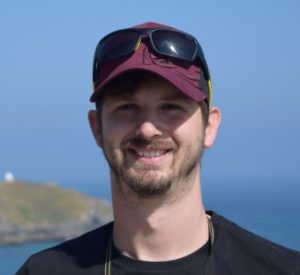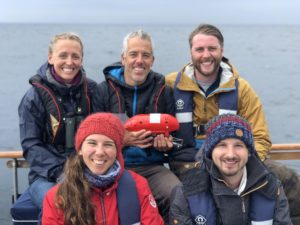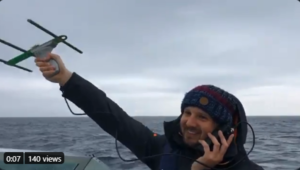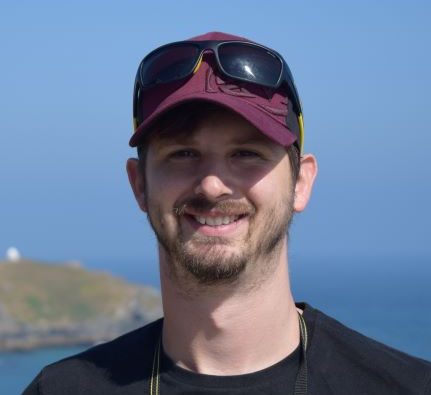Our world-leading marine research underpins a wide range of undergraduate and postgraduate programmes: Research-led teaching | Exeter Marine | University of Exeter. In our Graduate in Focus series we look at the achievements of our MSc graduates who have excelled in conservation around the world since studying with us.
Today we meet Chris Kerry, MSc Conservation and Biodiversity graduate (2018) and now completing his PhD at the University of Exeter!

Hi Chris! First off, why don’t you tell us what you are up to now and how you got there?
I used my time during the MSc to develop skills in marine spatial ecology. After graduating, I remained in contact with my research project tutor turning my MSc thesis into a publishable piece and gaining fixed term contract work to conduct spatial analysis for other lecturers and connected organizations. I was then written into a grant proposal as a research assistant which led to me being accepted as a funded PhD student based on these experiences.
It’s lovely to have you back with us! What did you enjoy most about studying your MSc with us at the University of Exeter Cornwall Campus?
I enjoyed being welcomed into a vibrant research community and participating in projects at the forefront of conservation efforts which were producing real world benefits.
The lecturers are enthusiastic about their research, they welcome student input and are keen to share their experiences and expertise. It is a supportive environment, from the accessibility of lecturers and research staff to having a designated space where MSc students can study and share knowledge and ideas.
I believe the rate of new research in conservation science coming out of Exeter is unparalleled, which makes the content of the courses more relevant and exciting.

How did the MSc help you in your career, and do you have any advice for students looking to pursue a similar career?
One of the most useful things was attending one to one sessions with advisors at the career zone who helped restructure my CV to be more appealing to employers and advise on interview techniques.
The sense of accomplishment at the end of the research project has to be one of my biggest highlights. The process of collecting and analyzing data and producing a thesis which informs conservation efforts is extremely rewarding.

Finally, Do you have any advice for anyone thinking of applying to any of our programmes at the University of Exeter?
Firstly, approach members of staff to see if they have any projects that you could assist with. Volunteering with ZSL during my MSc led to them offering me paid work afterwards. Likewise, undertaking an internship with Dr Matthew Witt led to us developing an MSc research project together and then being recruited as a research assistant.
Secondly, Cornwall has a wealth of people and groups outside the university working in Marine Conservation. During my MSc, I volunteered with Cornwall Wildlife Trust, ERCCIS, British Diver’s Marine Life Rescue, ORCA and Cornwall Seal Group Research Trust but there are also many others. Volunteering with these organisations, other than assisting in incredibly important work, provide valuable additional experience, networking opportunities and demonstrate a real desire to work in this sector which helps you to stand out.
Put yourself out there but do your research. Attending conferences and symposiums with speakers whose research genuinely aligns with your interests and skills is a great way to make connections. Being able to discuss their research with them in an informed way will help you to stick in their minds.
Thanks Chris!
If you want to find out more about any of our suite of #ExeterMarine Masters and Undergraduate courses use the links below!
- NEW: MSc in Marine Environmental Management
- NEW: MSc in Marine Vertebrate Ecology and Conservation
- MSc in Conservation and Biodiversity
- MSc in Conservation Science and Policy
- MSc in Evolutionary and Behavioural Ecology
- MSc in Sustainable Development
- MSc in Environment and Human Health
- MSc in Renewable Energy Engineering
- BSc Marine Biology
- BSc Zoology
- BSc Environmental Science
- BSc Conservation Biology and Ecology
- BSc Evolutionary Biology
- BSc Animal Behaviour
- BEng Renewable Energy Engineering

